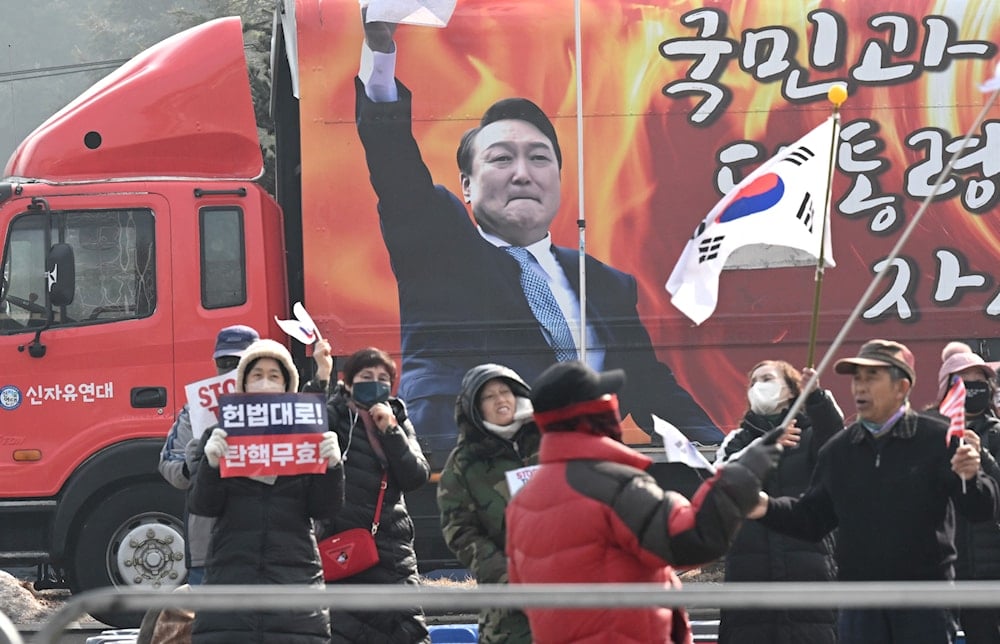Investigators advise Yoon be charged with insurrection, abuse of power
South Korea's economy grew at a slower-than-expected pace in the fourth quarter, according to data released Thursday.
-

Supporters of arrested and impeached South Korean President Yoon Suk Yeol gather outside the Seoul Detention Center in Uiwang on January 22, 2025 (AFP)
South Korean investigators recommended on Thursday that impeached President Yoon Suk Yeol be charged with insurrection and abuse of power.
The findings stem from their investigation into his controversial declaration of martial law, which they have now submitted to prosecutors.
The Corruption Investigation Office (CIO) formally accused Yoon of "leading an insurrection and abuse of power" following a 51-day probe into his December 3 attempt to suspend civilian governance.
The CIO stated it had "decided to request the Seoul Central District Prosecutors' Office file charges against the sitting President, Yoon Suk Yeol, in connection with allegations including leading insurrection."
Yoon had "conspired with the former Minister of National Defense and military commanders on December 3, 2024," the office said.
The declaration of martial law, the CIO said, aimed "to exclude state authority or disrupt the constitutional order, thereby inciting riots."
Under South Korea’s legal framework, prosecutors will now review the case file submitted under Yoon's designation as "president" and have 11 days to determine whether to press charges, which could lead to a criminal trial.
The prosecutors' office has "complied with the CIO's request for a case transfer," the investigators confirmed.
Yoon, who was arrested last week during a dawn raid on charges of insurrection, is the first sitting South Korean President to be detained as part of a criminal investigation.
His attempted martial law declaration plunged the nation into political turmoil, lasting only six hours before lawmakers voted it down and subsequently impeached him, stripping him of his executive duties.
Since his arrest, Yoon has refused to cooperate with the CIO’s probe. Lee Jae-seung, the deputy chief of the CIO, stated that Yoon has "obstructed searches and seizures, including access to secure communication devices like classified phones."
Citing these obstacles, the CIO determined it would be "more efficient" for prosecutors, who have the authority to indict suspects, to take over the case.
Yoon’s legal team, however, has challenged the CIO’s authority to investigate insurrection, urging prosecutors to "conduct an investigation that adheres to legal legitimacy and due process."
Abuse of authority
On the night of December 3, Yoon reportedly ordered military forces to storm the National Assembly and block lawmakers from voting on his martial law declaration.
The CIO’s investigation found that Yoon "abused his authority by compelling police officers from the National Assembly Guard Unit and martial law forces to perform duties beyond their obligations."
He also "obstructed the exercise of lawmakers' rights to demand the lifting of martial law," it added.
Yoon has denied accusations that he instructed military commanders to "drag out" lawmakers to prevent them from overturning his order.
Currently detained at a secure facility, Yoon remains head of state pending the Constitutional Court's decision on whether to uphold his impeachment. A ruling against him would permanently remove him from office, triggering new elections within 60 days.
In addition to the criminal probe, Yoon appeared in court this week for a hearing related to his impeachment. He is expected to testify again on Thursday, as witnesses are called to recount the events surrounding the martial law declaration.
Read more: South Korea's Yoon will accept court decision even if presidency ends
Recent developments 'significantly dampened economic sentiment'
South Korea's economy grew at a slower-than-expected pace in the fourth quarter, according to data released Thursday, as the fallout from Yoon's brief declaration of martial law weighed on consumer confidence and domestic demand.
The martial law declaration on December 3 delivered a jolt to Asia's fourth-largest economy. The central bank reported that GDP grew by just 0.1% quarter-on-quarter in October-December and 1.2% year-on-year.
For the full year, the economy expanded by 2%—an improvement from 2023, but 0.2 percentage points below earlier forecasts. The Bank of Korea earlier this week warned that the declaration of martial law, coupled with the December 29 Jeju Air plane crash that claimed 179 lives, had "significantly dampened economic sentiment."
In its latest outlook, the central bank revised its 2025 growth forecast downward to 1.6–1.7% from an earlier estimate of 1.9%.
The political upheaval sent consumer sentiment plummeting to its lowest level since the COVID-19 pandemic. Despite Yoon’s impeachment, the South Korean won dropped sharply against the US dollar, and unemployment rose to its highest level since 2021.
"The anemic growth in South Korea's GDP in the fourth quarter shows that the political crisis sparked by (Yoon's) failed martial law attempt is hitting the economy more than the Bank of Korea anticipated," Bloomberg economist Hyosung Kwon wrote.
"That leaves the door open for the central bank to resume cutting rates at its February meeting."
In response to mounting economic pressures, the South Korean government announced a $250 billion support package for exporters this week amid heightened concerns over potential tariffs from the Trump administration in the US.
As a nation reliant on exports, particularly advanced semiconductors, South Korea saw exports grow 6.9% year-on-year in 2024, while imports increased by 2.4% over the same period.
Despite the economic challenges, SK Hynix reported record sales in the fourth quarter, driven by its cutting-edge semiconductor business. The company posted a 75% year-on-year surge in revenue, reaching 19.7 trillion won ($13.7 billion), as demand for high-performance chips used in artificial intelligence (AI) technologies soared.
SK Hynix has been a key supplier of high-bandwidth memory (HBM) chips to US tech giant Nvidia, enabling advancements in the competitive AI sector.

 6 Min Read
6 Min Read








